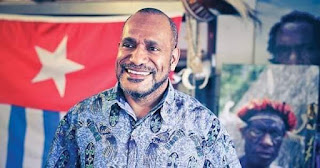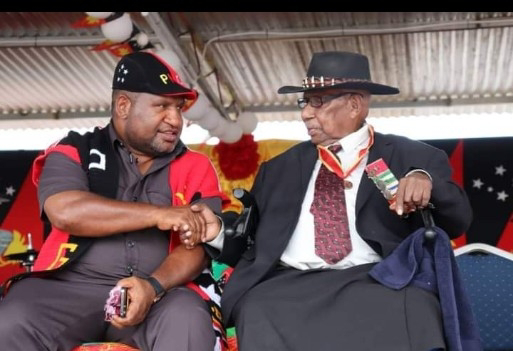16 August 2013
SONJA BARRY RAMOI
Belden NamahDEEP IN THE MOUNTAINS of Paru Paru village not far from Panguna mine - the village of the late secessionist leader and first president of Bougainville, Joseph Kabui – a delicate military action was underway.
Defence Force helicopter pilot, Captain Charlie Andrews, was ordered by PNG Defence Force Commander Brigadier General Jerry Singirok to get Captain Belden Norman Namah out of there.
The terrain was in enemy territory and under the control of the Bougainville Revolutionary Army. But there was no place for a chopper to land.
Captain Namah – in a daring display of bravery – was airlifted from the bush by hanging onto the skid of the chopper. Only a very strong and highly skilled man could do that. Namah was a highly trained Special Forces Unit commando.
Did Belden Namah, now Opposition Leader of Papua New Guinea, tell me the story to impress me? No. I heard the story from someone else and asked Namah to confirm if it was true.
"Yes it's true”, he replied. That was it.
There are many more tales of Namah’s military exploits and deeds to be told. Some, still classified, will no doubt surface later.
His role in rescuing OPM (Operasi Papua Merdeka) hostages the in two separate incidents near the PNG-Indonesia border in 1996 and 1999 still needs to be told.
I know Opposition Leader, Hon Belden Namah, very well. He is not scared of anything. He only fears God. He is a fighter and he doesn't go down easily.
If he was prepared to sacrifice his life and help save more than 360,000 lives on Bougainville and later go to jail with two comrades for resisting an intervention by mercenaries in the infamous Sandline Affair, does anyone seriously believe that an arrest warrant will scare him?
Why is so much speculation and false information about the Opposition Leader posted in the social media – especially Sharp Talk? Do his critics miss him that much?
Everybody loves a hero. PNG certainly needs many more heroes. When I wrote, during the political impasse, that retired Colonel Yaura Sasa would go down in the minds of many Papua New Guineans as a hero, I was criticised because Sasa had been charged with mutiny.
About one year later the mutiny charge against Sasa was thrown out thanks largely to leading Port Moresby lawyer Tony Waisi, from West Sepik. And the hero who quelled the so-called mutiny was none other than Belden Norman Namah, who should be credited for defusing a potentially deadly clash between factions of the army and the police force.
Some of us are too good at tearing down people and our political leaders based on false information and incomplete stories fed to us by a biased foreign and domestic media.
Napway Kunum, an engineer from Jiwaka Province, working on a fly in fly out basis on an offshore gas plant in Iraq, knows Belden Namah well from their student days at Sogeri National High school.
I asked Napway to share his recollection of Namah. Napway, was president of the Judo Club at Sogeri at the time and his room-mate was Gerald Alec from Sandaun Province.
Napway recalled that Belden - who was one year behind him and Gerald - would go to their room every Wednesday to join them at judo training.
“He is one of those that did not speak much but will listen attentively and then go ahead and will get things done,, recalled Napway, “on that you can depend on him. He was always in a hurry trying to get something done.”
He also described Namah as “quiet and easy going with determination.”
“If things aren’t right, he’ll throw himself at it to get it right. Those are his traits. One thing, he’ll call a spade a spade.
“He’ll be loyal to you when he knows that what you are doing is good for people and country. If it’s not he’ll be in the way. That’s all the way from Sogeri.”
It appears they spent a great deal of time talking about the OPM freedom movement in West Papua.
“OPM kept us busy discussing them into the night,” said Napway who added, “It’s not surprising that BN joined the army, and I thought Gerald also did.”
“One thing I found about BN is that he always had respect for me and Gerald, and he would listen attentively. Gerald and he would discuss the suffering of the West Papuans and I would listen in on how unfairly they were treated.
“They’ll say it’ll be best to help them out. So there and then I knew that BN would always fight for the underdogs, and that’s natural, his inbuilt character.”
When Napway, who has worked in many places in PNG and overseas as an engineer in the petroleum industry, was in Kutubu he knew three security supervisors who had been in the army and served in Bougainville during the civil war.
“They said BN is one hell of a person who can move single-handedly forward after he planned out an operation and those were daring ones. They didn’t tell me the full story but I could gather from what they were saying that BN was one hell of a warrior.”
I confided in Napway: “In this very volatile world, you and I know that PNG needs BN”.
Napway replied: “PNG needed BN 40 years ago, Sonja, and that’s not kidding. That’s not discrediting our fathers who brought us to independence. They did what they could. Between independence and now, we let greed get in the way of developing our nation. And that’s where we need him. And that’s 40 years back.”
Certainly nobody can rightfully claim that Belden Namah is greedy, certainly not when he is probably Papua New Guinea’s first multimillionaire philanthropist politician who gives from the goodness of his heart and not to get publicity.
Are there so many gullible people around? If it was true that Belden Namah is a power-hungry ‘would be dictator’, then why did he hand power over to Peter O’Neill, practically on a golden platter, when he had the numbers and the money to become prime minister himself?
One thing is for certain, considering the tremendous support he had at the time, he could have simply snapped his fingers and taken over the country if he had so desired.
Belden Namah is a world leader - whether some stupid people like it or not - who at least can afford to pay for his travels around the world using his own private funds.
Not long ago he was in Europe. Ask yourself - how many politicians can purchase airfares and stay in five star hotels using their own honest, hard earned money? It seems that not many people know that Belden Namah is a self-made multimillionaire today because he wisely invested the money he made - starting many years ago before he entered parliament - from his share of timber royalties.
Starting from day one, he has made his stance very clear on the asylum seekers and many other issues more than enough times already. Why should he keep on repeating himself like a fool for fools? If people missed what he has said they can always look it up!
Namah is a man who is short, sharp and straight to the point. He is a 'silent achiever' who does not go around boasting and bragging about what he has achieved in order to appear more popular by scoring likes on the social media forums.
Belden Namah is a leader who believes in sharing duties and responsibilities. He does not have a monumental ego that says, 'me, me, me’ unlike certain other politicians who enjoy scoring political points by attacking and trashing their opponents.
Namah certainly would never shout at anybody merely for asking questions, unlike some more loudmouth leaders.
Where other leaders are haughty and hypocritically full of themselves - with their egos maybe somewhere up in the sky - Namah is down to earth, humble and honourable.
I have met and spoken with many politicians and statesmen – governor generals, prime ministers, deputy prime ministers, opposition leaders, speakers, ministers, ordinary MPs, premiers, deputy premiers, presidents, lord mayors – at both national and local level from when I was a kid.
Politics is in my blood. It is in my family – on both sides.
I foresee that Belden Namah will become prime minister one day and that he has a long political career ahead of him – akin to two political icons and giants from the Sepik: Sir Michael Somare and Sir Pita Lus.
Until recently, I would normally keep confidential what politicians I know and what I know about them.
"We are duty bound to give back to our people their sovereignty, freedom, pride and independence,” Belden Namah said recently.
“We are an independent nation. Australians have f'ed us up since they colonised us. They left us with basically nothing when we became independent in 1975.
“We can't afford to bring them back. We do not need their support either. We have all the wealth in the world God has blessed us with. All we need is a strong, vibrant, prudent and patriotic leadership.
“We are the only ones who can provide that to protect our people from neo-colonialism and corporate greed.
“May we be God's instruments of change for our people and our beautiful country.”















